Share
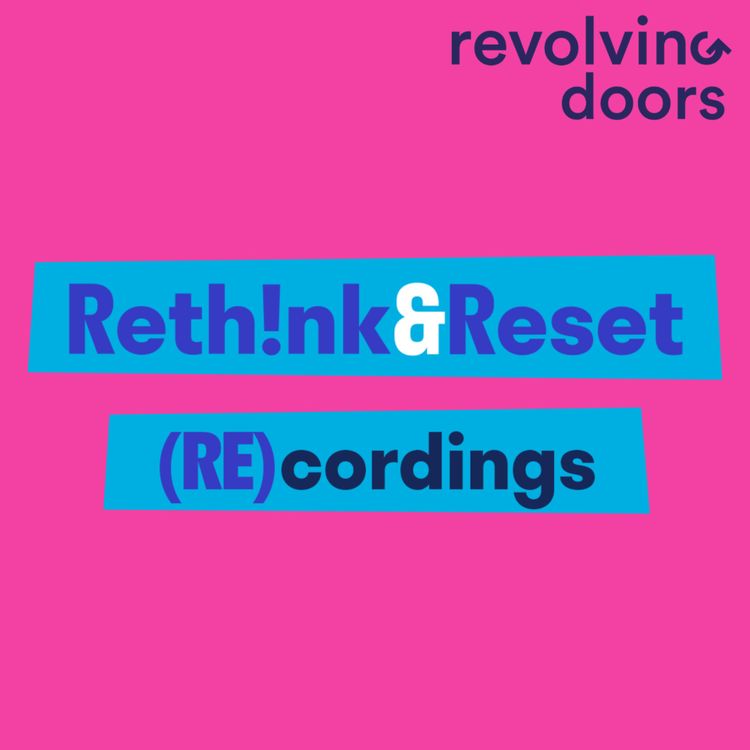
Revolving Doors Podcast
Rethink & Reset (RE)cordings Ep. 2: Unmet needs, disclosure & rebuilding confidence
Welcome to Rethink & Reset, a podcast series from Revolving Doors.
In this series we'll be delving into the heart of our criminal justice system, as we speak to experts including our lived experience members, activists, and sector professionals about what needs to change to create a smarter, more humane system.
Episode 2 features Revolving Doors lived experience member Caroline. Caroline was able to break free of the cycle of mental health-driven repeat offending following a court-mandated Mental Health Treatment Order (MHTR). In this episode she discusses the issue of unmet needs surrounding mental health and addiction within the criminal justice system, and her experience of rebuilding confidence, finding her voice, and accessing training and employment as she trains to be a cybersecurity specialist.
More episodes
View all episodes
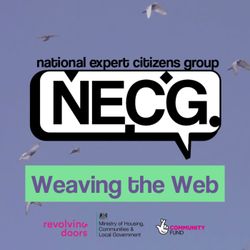
Weaving the Web Ep. 7: Lived experience involvement at every level
22:34|Welcome to Weaving the Web - the podcast series from the National Expert Citizens Group (NECG).In this series, we'll be exploring examples of good practice around our four strategic priorities. These are the issues lying at the heart of what's known as 'multiple disadvantage' – where someone experiences a combination of several unmet health and social needs – in England and Wales today.In our final episode, we'll be speaking to Winston Allamby, who runs Lewisham's Experts by Experience Network (LEEN) about the work that's happening to integrate lived experience involvement and coproduction at every level of public health service commissioning and delivery.Coordinated by Revolving Doors, the NECG is the lived experience group for people in the Changing Futures programme, a joint-funded initiative of the National Lottery Community Fund and the Ministry for Housing, Communities and Local Government. By co-producing solutions with people who have lived experience of multiple disadvantage, we’re here to shape system change and advocate for services that are trauma-informed, accessible and person-centred.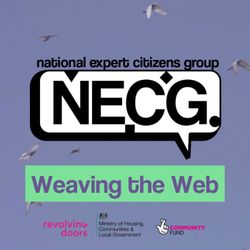
Weaving the Web Ep. 6: Breaking the cycle of crisis and crime
22:41|Welcome to Weaving the Web - the podcast series from the National Expert Citizens Group (NECG).In this series, we'll be exploring examples of good practice around our four strategic priorities. These are the issues lying at the heart of what's known as 'multiple disadvantage' – where someone experiences a combination of several unmet health and social needs – in England and Wales today.In our sixth episode, we'll be exploring the third of our strategic priorities: the criminal justice system. Charlotte speaks to Kelly Grehan, Policy Manager at NECG coordinator and national justice charity Revolving Doors, about their solutions to ending the cycle of reoffending driven by unmet needs.Coordinated by Revolving Doors, the NECG is the lived experience group for people in the Changing Futures programme, a joint-funded initiative of the National Lottery Community Fund and the Ministry for Housing, Communities and Local Government. By co-producing solutions with people who have lived experience of multiple disadvantage, we’re here to shape system change and advocate for services that are trauma-informed, accessible and person-centred.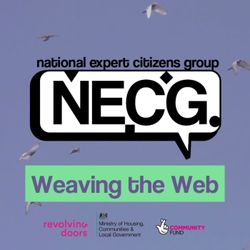
Weaving the Web Ep. 5: Support for unmet needs to reduce reoffending in the community
23:41|Welcome to Weaving the Web - the podcast series from the National Expert Citizens Group (NECG).In this series, we'll be exploring examples of good practice around our four strategic priorities. These are the issues lying at the heart of what's known as 'multiple disadvantage' – where someone experiences a combination of several unmet health and social needs – in England and Wales today.In our second episode, we'll be exploring the third of our strategic priorities: the criminal justice system. Join NECG member and host Charlotte as she speaks to our three guests: Chris Pearson, Chief Inspector at Nottinghamshire Police; Bobby Lowen, Programme Director at Changing Futures Nottingham; and Matt Hunt – whose role as Changing Futures Severe & Multiple Disadvantage Practitioner within the Nottinghamshire Probation Trust is the first of its kind. Coordinated by Revolving Doors, the NECG is the lived experience group for people in the Changing Futures programme, a joint-funded initiative of the National Lottery Community Fund and the Ministry for Housing, Communities and Local Government. By co-producing solutions with people who have lived experience of multiple disadvantage, we’re here to shape system change and advocate for services that are trauma-informed, accessible and person-centred.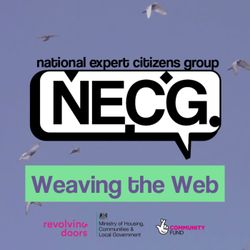
Weaving the Web Ep. 4: Joined-up solutions to mental health and substance use
21:28|Welcome to Weaving the Web - the podcast series from the National Expert Citizens Group (NECG).In this series, we'll be exploring examples of good practice around our four strategic priorities. These are the issues lying at the heart of what's known as 'multiple disadvantage' – where someone experiences a combination of several unmet health and social needs – in England and Wales today.In our fourth episode, we'll be exploring the second of our strategic priorities: dual diagnosis (also known as co-occurring needs) as NECG member and host Charlotte speaks to Alison Bearn, Programme Manager at the London Co-occurring Conditions Programme, about how integrated solutions to mental health and substance use can expand access to support and recovery.Coordinated by Revolving Doors, the NECG is the lived experience group for people in the Changing Futures programme, a joint-funded initiative of the National Lottery Community Fund and the Ministry for Housing, Communities and Local Government. By co-producing solutions with people who have lived experience of multiple disadvantage, we’re here to shape system change and advocate for services that are trauma-informed, accessible and person-centred.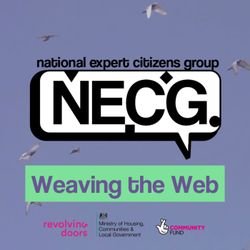
Weaving the Web Ep. 3: Collaborative commissioning in recovery services
21:44|Welcome to Weaving the Web - the podcast series from the National Expert Citizens Group (NECG).In this series, we'll be exploring examples of good practice around our four strategic priorities. These are the issues lying at the heart of what's known as 'multiple disadvantage' – where someone experiences a combination of several unmet health and social needs – in England and Wales today.In our third episode, we'll be exploring the second of our strategic priorities: dual diagnosis (also known as co-occurring needs), and taking a look at coproduced approaches to service commissioning. We’ll be speaking to Laurence and Beth from the Essex Recovery Foundation about the groundbreaking approach being taken in Essex, where the local recovery community is working with the council to coproduce healthy systems and healthy outcomes for those in recovery.Coordinated by Revolving Doors, the NECG is the lived experience group for people in the Changing Futures programme, a joint-funded initiative of the National Lottery Community Fund and the Ministry for Housing, Communities and Local Government. By co-producing solutions with people who have lived experience of multiple disadvantage, we’re here to shape system change and advocate for services that are trauma-informed, accessible and person-centred.To find out more about the NECG, visit our website or read our latest report, Exploring Solutions to Multiple Disadvantage.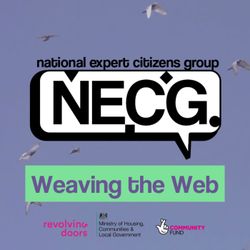
Weaving the Web Ep. 2: A coproduced approach to tackling homelessness
21:23|Welcome to Weaving the Web - the podcast series from the National Expert Citizens Group (NECG).In this series, we'll be exploring examples of good practice around our four strategic priorities. These are the issues lying at the heart of what's known as 'multiple disadvantage' – where someone experiences a combination of several unmet health and social needs – in England and Wales today.In our second episode, we'll be exploring the first of our strategic priorities: housing and homelessness. We’ll be speaking to Jim Thomson and Midori Hol from Westminster-based homeless charity The Passage about their coproduced framework for tackling homelessness and how service user involvement can be brought into the mainstream.Coordinated by Revolving Doors, the NECG is the lived experience group for people in the Changing Futures programme, a joint-funded initiative of the National Lottery Community Fund and the Ministry for Housing, Communities and Local Government. By co-producing solutions with people who have lived experience of multiple disadvantage, we’re here to shape system change and advocate for services that are trauma-informed, accessible and person-centred.To find out more about the NECG, visit our website or read our latest report, Exploring Solutions to Multiple Disadvantage.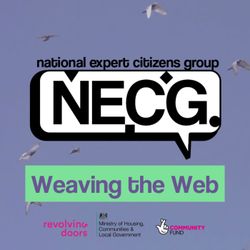
Weaving the Web Ep. 1: Can Housing First fix the homelessness crisis?
23:07|Welcome to Weaving the Web - the podcast series from the National Expert Citizens Group (NECG).In this series, we'll be exploring examples of good practice around our four strategic priorities. These are the issues lying at the heart of what's known as 'multiple disadvantage' – where someone experiences a combination of several unmet health and social needs – in England and Wales today.In our first episode, we'll be exploring the first of our strategic priorities: housing and homelessness. We’ll be speaking to Jo Prestidge from Homeless Link and Georgia Nevitt from St Mungo’s about their work on the pioneering Housing First model - and whether it could be the key to cracking the homelessness crisis.Coordinated by Revolving Doors, the NECG is the lived experience group for people in the Changing Futures programme, a joint-funded initiative of the National Lottery Community Fund and the Ministry for Housing, Communities and Local Government. By co-producing solutions with people who have lived experience of multiple disadvantage, we’re here to shape system change and advocate for services that are trauma-informed, accessible and person-centred.To find out more about the NECG, visit our website or read our latest report, Exploring Solutions to Multiple Disadvantage.
Rethink & Reset (RE)cordings Ep. 6: Drug decriminalisation, poverty, and policing
31:06|Welcome to Rethink & Reset, a podcast series from Revolving Doors. In this series we'll be delving into the heart of our criminal justice system, as we speak to experts including our lived experience members, activists, and sector professionals about what needs to change to create a smarter, more humane system.In our sixth and final episode of this series, we speak to Jason Kew, former Thames Valley Police Chief Inspector and current Senior Innovative Practice Officer at the Centre for Justice Innovation. Jason joins us to share what his career in policing has taught him about the need for drug decriminalisation and action on poverty, as well as the interaction between policing and politics and the role that the police should play in our society today.
Rethink & Reset (RE)cordings Ep. 5: Music, racism & youth work
31:54|Welcome to Rethink & Reset, a podcast series from Revolving Doors. In this series we'll be delving into the heart of our criminal justice system, as we speak to experts including our lived experience members, activists, and sector professionals about what needs to change to create a smarter, more humane system.For Episode 5, we speak to youth worker, education consultant and author Ciaran Thapar. With over a decade's experience working with young people, Ciaran is the author of Cut Short: Youth Violence, Loss and Hope in the City, and joins us to talk about social change, race, and the role that music (specifically drill and rap) plays in the lives of young, socially excluded people.